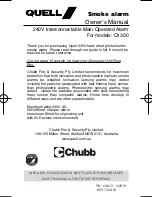
Page 5
Red / Green / Red w/Black Trace 3 Pin White Connector : Door Lock Outputs
The Red and Green wires will provide either a pulsed ground output to the factory door lock control relay,
or a 12 volt output to the factory door lock control relay. In either case, the maximum current
draw through these outputs must not exceed 300 mA. The Red w/Black trace wire will provide a pulsed
ground only and will only provide an output when the unlock button of the transmitter is pressed a second
time after a first unlock command was issued. This is used for second step unlock or all doors unlock in
a two step circuit. In this arrangement, Red is used to control the drivers door unlock relay, and the Red/
Black will be used to control unlock of all other doors.
3 Wire Ground Switched Single Step Door Locks
In this application, the red wire provides a ground pulse during arming, or the pulsed ground lock
output. Connect the red wire to the wire that provides a low current ground signal from the factory door
lock switch to the factory door lock control relay.
The green wire provides a ground pulse during disarming, or the pulsed ground unlock output. Con-
nect the green wire to the wire that provides a low current ground signal from the factory door unlock
switch to the factory door lock control relay.
Red/Black Not Used.
3 Wire Ground Switched 2 Step Door Locks
In this application, the red wire provides a ground pulse during arming, or the pulsed ground lock
output. Connect the red wire to the wire that provides a low current ground signal from the factory door
lock switch to the factory door lock control relay.
The green wire provides the first ground pulse during disarming, or the drivers door pulsed ground
unlock output. Connect this wire to the drivers door unlock relay that requires a low current ground
signal to unlock only the drivers door. If the vehicle does not have a separate drivers door relay, one will
have to be added. Locate the drivers door unlock motor wire and cut it at a convenient location to allow
wiring of an optional relay. Connect the door side of the cut wire to terminal 30 of the optional relay added.
Connect the vehicle side of the cut wire to terminal 87a of the optional relay added. Connect the green
wire of the 3 pin harness to terminal 86 of the optional relay added. Connect terminal 85 of the optional
relay added to a fused co 12 volt source. Most vehicles door lock/unlock motor legs rest at
ground, and 12 volts to the door lock/unlock motor legs for operation, if this is the case in the
vehicle you are working on, connect the remaining terminal, 87, to a fused + 12 volt source. In the rare
instance that the vehicle door lock/unlock motor legs rest at + 12 volts and switches ground to the door
lock/unlock motors, connect he remaining terminal, 87, to chassis ground.
The Red/Black wire provides a pulse ground output when the unlock button of the transmitter is pressed
a second time after disarming. Connect the Red/Black wire to the wire that provides a low current ground
signal from the factory door unlock switch to the factory door lock control relay.
3 Wire Positive Switched Door Locks
In this application, the red wire provides a positive pulse during disarming, or the 12 volt
unlock output. Connect the red wire to the wire that provides a low current positive signal from the factory
door unlock switch to the factory door lock control relay.
The green wire provides a positive pulse during arming, or the 12 volt lock output. Connect the
green wire to the wire that provides a low current positive signal from the factory door lock switch to the
factory door lock control relay.
3 Wire Positive Switched 2 Step Door Locks
The green wire provides a positive pulse during arming, or the 12 volt lock output. Connect the
green wire to the wire that provides a low current positive signal from the factory door lock switch to the
factory door lock control relay.
The red wire provides a positive pulse during disarming, or the drivers door pulsed positive unlock
output. Connect this wire to the drivers door unlock relay that requires a low current positive signal to
unlock only the drivers door. If the vehicle does not have a separate drivers door relay, one will have to be
added. Locate the drivers door unlock motor wire and cut it at a convenient location to allow wiring of an
optional relay. Connect the door side of the cut wire to terminal 30 of the optional relay added. Connect
the vehicle side of the cut wire to terminal 87a of the optional relay added. Connect the red wire of the 3
































